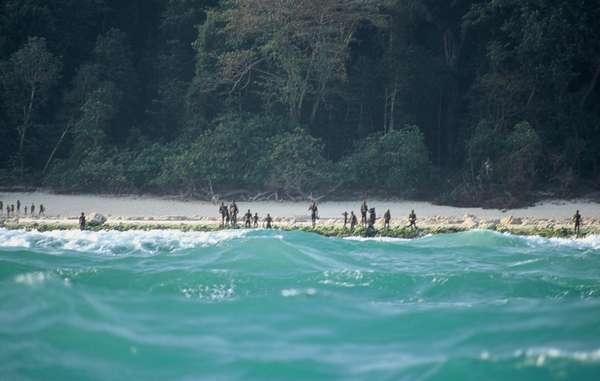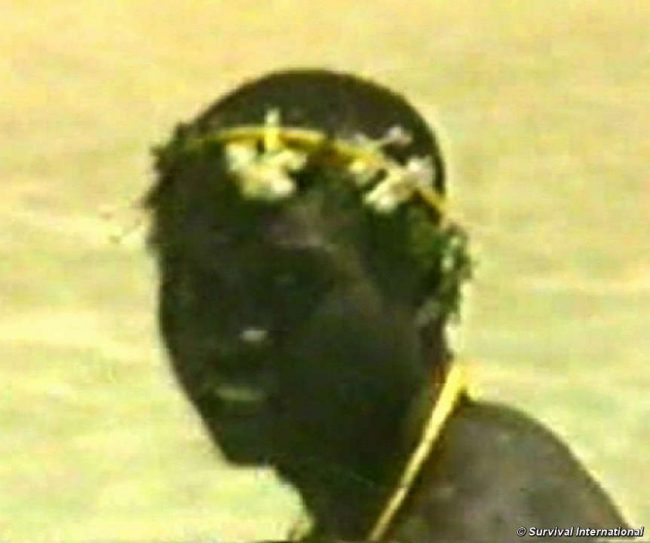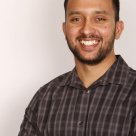Anthropologists and tribal welfare experts say any mission to retrieve the body of slain American missionary John Chau from a remote island off the east coast of India could pose an existential threat to the endangered tribe that killed him.

Indian authorities have been grappling with how to retrieve the body of Chau, a 26-year-old missionary and self-styled Instagram adventurer believed to have been killed by arrow-wielding tribesmen on North Sentinel, part of the Andaman & Nicobar Islands territory.
WATCH: Who are the Sentinelese people? A look at the history of the tribe

Police have carried out an aerial survey and two boat visits, and observed from a distance as members of the tribe guarded the section of the beach where it’s believed the body was buried, said the islands’ director-general of police Dependra Pathak.
In a tweet, Pathak dubbed the case his “most challenging ever,” but said he remained hopeful that authorities would come up with a strategy to retrieve Chau’s body without confronting the tribe.
But many experts say that authorities shouldn’t bother.
READ MORE: Police struggle to recover body of American killed on isolated Indian island
Kanchan Mukhopadhyay, a government anthropologist who was previously stationed in the Andamans, told the Guardian that Chau had already knowingly violated the tribe’s will by making repeated, illegal visits to the island — “And this retrieval of the body will again violate the will of the people,” he said.

Anup Kapoor, a New Delhi-based anthropology professor who has had contact with other tribes in the Andamans, told AFP that the lack of detailed knowledge about the Sentinelese would hamper any attempt to retrieve Chau’s body.
“We have no clue about their communication systems, their history and culture — how can we go anywhere near them?” said Kapoor.
“Let them be the way they are. Leave them in peace in the ecosystem they are in. Do not disturb them because that will only make them more aggressive.”
WATCH: Diary reveals final hours before American missionary killed on remote Indian island

An entry from Chau’s own diary revealed that he was aware of the perils that awaited him on the island.
“Please do not be angry at them or at God if I get killed,” he wrote.
“Don’t retrieve my body.”
Sophie Grig, a senior research and advocacy officer with Survival International, an NGO that campaigns for the protection of tribal groups, told Global News that Chau’s decision to go to the island was a “foolhardy” one.
“It was incredibly dangerous for him and a foolhardy thing to have done, but even more dangerous for the Sentinelese themselves,” Grig said. “They are the most isolated tribe on earth, so they’re the most vulnerable in terms of a lack of immunity to common diseases like flu and measles that will decimate the tribe.”

Grig told Indian news channel NDTV that attempts to retrieve Chau’s body could pose a threat to the Sentinelese as well as authorities who try to set foot on the island.
“This sad situation is obviously terrible for the man and his family, but could also be potentially totally devastating for the Sentinelese, who could still be wiped out by diseases he introduced when he arrived there,” Grig said.
“It’s incredibly dangerous for the Sentinelese to have anyone go there — and also for anyone attempting to go and retrieve the body — so it seems to me an unwise move to be doing that.”
READ MORE: Mystery, danger surround isolated Indian island where U.S. man was killed
In 2006, the Sentinelese killed two Indian crab fishermen who washed up on their shores.
About a week later, they dug up the bodies and strung them up on bamboo poles facing the ocean.
Authorities decided not to retrieve their bodies in order to avoid contact with the tribe.
“The Indian Coast Guard and police must be commended in this case for resisting local pressure to retrieve the men’s bodies, thereby avoiding further contact with the Sentinelese,” Samir Acharya, an activist with local environmental organisation SANE, said in 2006 in the wake of the fishermen’s deaths.
On Sunday, India’s Minister of State for External Affairs condoled Chau’s death but reiterated the Indian government’s longstanding stance against any form of contact with the tribe.
“We have had such incidents earlier too, that’s why the government had a policy that nobody should go there,” V.K. Singh told Indian news agency ANI. “It’s a separate tribal group; they do not want outsiders. It is a very sad incident.”
WATCH: U.S. Christian missionary killed by isolated Indian tribe

Chau’s diary revealed that he sought to bring Christianity to the tribe, who have lived on the island for tens of thousands of years.
He went to “share the love of Jesus,” said Mary Ho, international executive leader of All Nations, a Missouri-based organization that trained Chau and sent him on the mission to support him in his “life’s calling.”
“He wanted to have a long-term relationship, and if possible, to be accepted by them and live amongst them,” Ho said.
All Nations contacted the U.S. Department of State, Ho said, adding that she doesn’t know whether it will be possible to recover Chau’s body.
“We are just in grief and in shock about his death,” she said. “At the same time, we consider it a real honour to have worked with him, to have been a part of his journey.”
WATCH: Friend mourns death of Christian missionary killed by isolated Indian tribe

T.N. Pandit, an 83-year-old anthropologist who interacted with some of the Sentinelese tribesmen back in the 1970s — when scholars and officials more regularly visited the islands — told the Indian Express that tribes on the Andamans have resisted previous attempts at religious conversions.
He said that any talk of prosecuting the tribesmen, who have special protected status under Indian law, was senseless.
“These are not their laws. They were protecting what is theirs, just like we do,” Pandit told the newspaper. “We forget, the civilized man is the aggressor here.”
— With files from the Associated Press




Comments